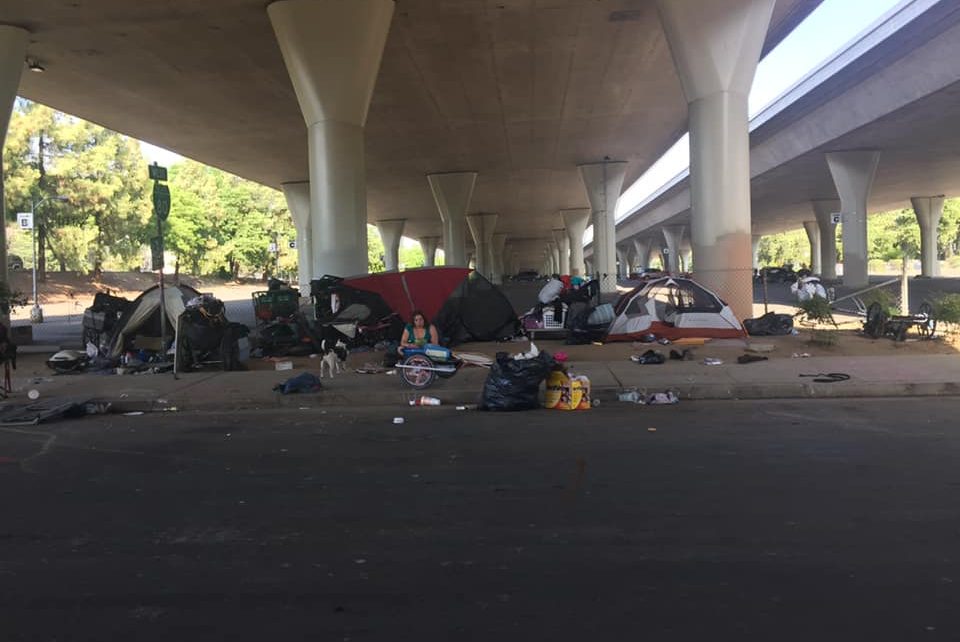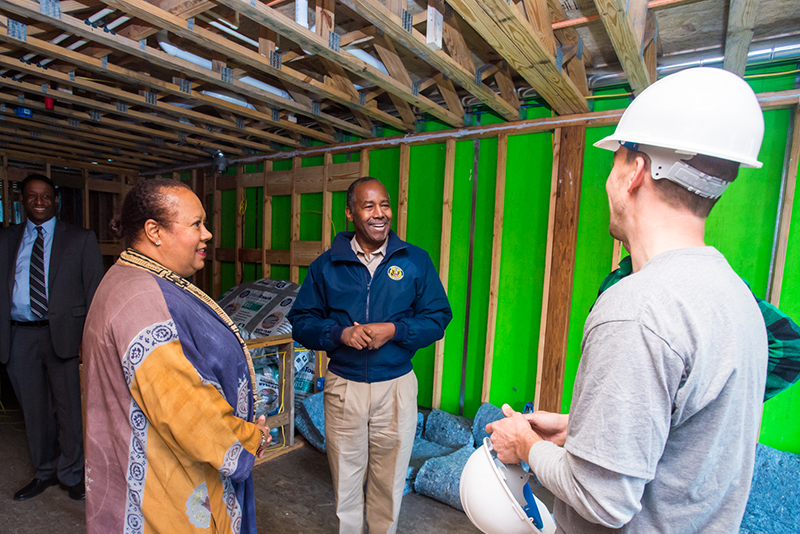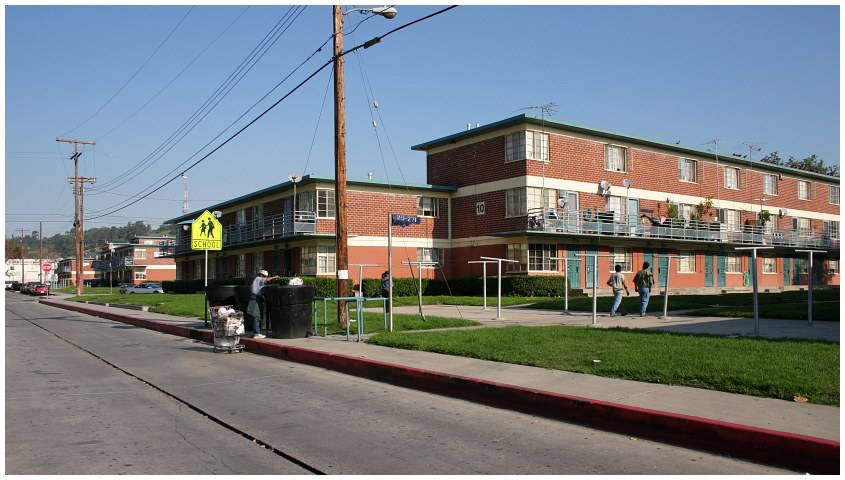
Homeless living under the W/X freeway in Sacramento. (Photo: Katy Grimes for California Globe)
California Senate Passes ‘Housing for Homeless,’ Bill With Penalty Component
In Sacramento, home of the state government, homelessness is up 56 percent increase in the past two years
By Katy Grimes, July 2, 2019 2:08 am
The Legislature can do an immediate legislative fix
The Committee on Budget and Fiscal Review authored AB 101, which provides for statutory changes needed to enact the housing and homelessness-related provisions of the Budget Act of 2019.
In short, the Legislature is making legislative changes to the legislatively-created housing and homeless problem in California, according to Sen. Jim Nielsen (R-Gerber). Nielsen said, “some of those have been foisted on that community by this Legislature.”
AB 101 would require the state Office of Audits and Evaluation to audit the Community-Based Transitional Housing Program, which provides grants to cities and counties to increase the supply of transitional housing available to recent parolees, and to report the results of the audit to the Joint Legislative Budget Committee by May 1, 2020. Current law requires the Office of State Audits and Evaluations to complete the audit and to report to the Joint Legislative Budget Committee by May 1, 2019.
But if the city or county does not properly comply, punishment will come from the Attorney General.
Senators spoke in favor of the bill, and it was passed by the Senate 39-0. However, many Senators still blame the homeless explosion on lack of affordable housing in California, and not on opioid drug addiction and the crime used to support the habit, serious mental illness, other addictions, as well as the laws which decriminalized drug crimes, violent sex crimes, theft, as well as elder and dependent adult abuse, assault with a deadly weapon, rape… many crimes previously considered violent.
Sen. Bob Hertzberg (D-Van Nuys), called the crisis an “urgent moral issue,” and said, “only permanent housing solves homelessness.”
Some Senators blame the affordable housing crisis on wages in the state not being high enough to afford skyrocketing rents. Sen. Maria Elena Durazo (D-Los Angeles) said half of the people living on the streets “have jobs, but don’t make enough money.” She said they “live in cars or on someone’s sofa.”
Sen. John Moorlach (R-Costa Mesa) addressed the seriously mentally ill and the need for involuntary housing. “What about those who cannot take care of themselves?” Moorlach asked.
The bill seems heavy handed if the goal is to quickly build more affordable and transitional housing and get people off of the streets.
The bill analysis said this bill would require Housing and Community Development to offer the city/county the opportunity for two meetings (in person or telephone) to discuss their violations and to provide the city/county written findings regarding the violation prior to allowing the Attorney General to bring suit against the city or county. It would then allow the Attorney General to seek, and a court to allow, certain remedies when the court finds that a local jurisdiction is not substantially compliant with housing element law.
AB 101 would require the California Attorney General to request, upon a finding of the court that the housing element of a city or county does not substantially comply, that the court issue an order or judgement directing the city/county to bring its housing element into compliance, and would require the court to retain jurisdiction to ensure that its order or judgement is carried out. Once the court determines that the housing element substantially complies, this bill would provide that the court determination has the same force and effect as HCD’s determination that the housing element substantially complies.
Sen. Nancy Skinner (D-Berkeley) expressed concern that AB 101 too narrowly defines who can receive the housing benefit. Skinner said if someone is already homeless, or of they are within 14-days from being evicted/homeless, they qualify. But, Sen. Skinner pointed out, many people move out of their rentals prior to being evicted, even if they become homeless, rather than have an eviction on their record – the kiss of death in ever qualifying for another rental. She said that homelessness in Alameda County, her district, is up over 47 percent since 2017.
In Sacramento, home of the state government, homelessness is up 56 percent in the past two years.
But too many lawmakers remained focused on the high cost of housing in California as the reason so many live on the streets in the Golden State. If that was truly the cause/effect, the Legislature could immediately suspend the state’s notorious building requirements like the California Environmental Quality Act, and require cities and counties to remove their many layers of building restrictions, regulations, permits and hefty fees, and mandate a time frame in which housing projects are approved. And they could do this under an emergency order.
However, while there is most definitely a housing shortage in California, the people with jobs who live in their cars are often young tech-industry workers living in the most expensive area of California — Palo Alto, in Santa Clara County near the San Francisco Bay area, where the median home price is $2,932,700.
Building more housing would help the cost of housing drop dramatically, eventually. But for the drug-addicted criminals, and the severely mentally ill, housing isn’t the only answer, and it may not be the right answer. Treatment for those folks is the first step. As for the violent sex offenders living on the streets instead of in jails and prisons, and the felony rapists and human sex traffickers, which are no longer considered violent felonies, the Legislature can do an immediate legislative fix.
Instead, six real criminal justice reform bills were killed last year in the California Legislature which would have expanded the definition of violent crime to include human trafficking, elder and dependent adult abuse, assault with a deadly weapon, rape, and other crimes most Californians consider violent.
These six bills would have corrected unclear language and serious flaws in Proposition 57, passed in 2016 by voters. Prop. 57, titled the “Parole for Non-Violent Criminals and Juvenile Court Trial Requirements Initiative,” was to increase rehabilitation services and decrease the prison population. Though the measure passed, it was misleading on many fronts. Voters believed the title and passed the initiative.
As Prop. 57 stands, crimes such as human trafficking, child abduction, elder and dependent adult abuse, assault with a deadly weapon, and rape of an unconscious person, are no longer considered “violent crimes.”
Fixing California’s homeless crisis is a multi-pronged process, but not insurmountable. Housing is one important component, as is addressing the rampant criminal justice element, and the desperate need for mental illness treatment facilities and involuntary housing, and this can all be done immediately by this Legislature.
- What is Gov. Newsom’s California Climate Action Corps and Why is He Expanding It? - April 26, 2024
- Gov. Newsom’s and AG Bonta’s Affordable Housing Shakedown Scheme - April 25, 2024
- 6 California Cities Make the Least Affordable List for Home Buyers - April 24, 2024





http://chng.it/4pcFLtFxPL
https://www.change.org/p/declare-state-of-emergency-in-california-for-homeless?recruiter=243987901&utm_source=share_petition&utm_medium=copylink&utm_campaign=share_petition
Another fine article on this subject.
It’s amazing that these state legislators and office-holders continue to do the polar opposite of what is needed. That they could also begin a fix to this situation right now — and WON’T — confirms for me that they have a huge twisted stake in preserving the misery of people on the street. And now they pretend the answer to this misery is to irrelevantly threaten local communities who won’t instantly knuckle under to state housing mandates? (“Whether you like it or not!” as Gov Newsom once said.)
It’s really mind-boggling that they continue to push housing as a cure-all for homelessness/vagrancy when most on the street suffer from drug addiction, mental illness, and alcoholism. They won’t even accept offers for temporary shelters. But for Prop 47 many would be incarcerated.
I don’t think I’d agree with everything Beverly Hills Mayor John Mirisch says, but he wrote a column recently that I thought was right on. His subject is SB 50 but I think it applies here. Especially since SB 50 (and its gut-and-amend followups), as a stack-and-pack housing bill that obliterates suburbs, is invoked as a magical cure for homelessness. But I’m wondering if these politicians are actually looking to further enrich the wealthy investors who support them?
“Wall Street Salivates at the Housing Solution Offered by SB50”
https://calmatters.org/articles/commentary/housing-crisis-5/
Thank you @Showandtell.
It is becoming more clear, this is about obliterating suburbia. The repeated answer I read from my local county officials is to build permanent supportive housing. This leads to a push for higher local taxes.
The pack and stack seems to be the answer of the 21st century, here in the Bay Area.
My historic neighborhood is witnessing what you just described, tortured souls with untreated mental illness and drug addiction. We have had 8 encampment fires within 6 days.
I look forward to reading the recommended article.
Wendy A., I appreciated your reply.
The good news is that regular people are waking up with righteous anger to see the true story of this situation and putting the blame where it belongs: On politicians and government officials who refuse to do the jobs we pay them to do (but always want more money). The more they offer nonsense “solutions” in response, the more the public can see that they are NOT compassionate, NOT helpful, NOT earnest, and NOT serving anyone… except themselves. Or so they think.
Whatever their motives, NO ONE is benefiting from this failure of leadership; least of all the tortured souls (as you put it) on our streets.
This will be addressed one way or another. Let’s hope it doesn’t come to a mega-crisis where FEMA has to respond to a monstrous public health emergency.
More good news is that things are happening here in southern California; many high-profile people are using their soapboxes to not only talk but take action. There is in-depth local news coverage of the situation (NBCLA). I suspect a similar movement is likely afoot in northern California. Great news sources like The Globe are consistently giving us excellent information and analysis not otherwise found. Comment sections here and elsewhere give us a forum to share stories from all over the state, which lets us know that it is not only the largest CA cities that are afflicted. There is power in that knowledge. (In fact, until Katy Grimes wrote about the encampments and problems in Sacramento, many of us in the L.A. area had no idea Sacramento was similarly plagued.)
In a few short weeks we have been very quickly learning more and figuring out more and fighting back more. This is heartening!
Best wishes.
Those who call for the California Environmental Quality Act (CEQA) to be abolished will be mightily surprised when their city, or the State, comes to take their property, or their nextdoor neighbor’s property, by eminent domain for the next transitional housing project. Pre CEQA, this happened to thousands of homeowners when the State wanted a housing project or a new freeway, with disastrous results, both for the private property owners, but the neighborhoods and cities as well. Be careful what you wish for. CEQA came about for good reason. And you can bet that wealthy neighborhoods full of residents with powerful connections will make sure it doesn’t happen in THEIR neighborhoods. Cities that immediately come to mind, like San Marino (a very wealthy city nextdoor to Pasadena) and Montecito (a very wealthy, unincorporated enclave, nextdoor to Santa Barbara) somehow get away without having to contribute one low or moderate income housing unit, while their neighboring cities carry the burden. This is a complicated subject and it needs much more thoughtful policy solutions. Riling up folks with conservative platitudes like getting rid of CEQA, deregulating everything, will not lead to smart solutions.